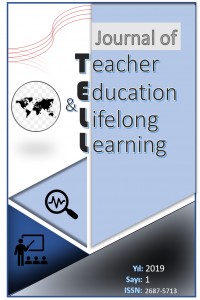Abstract
References
- Ambrose, S. A., Bridges, M. W., DiPietro, M., Lovett, M. C., & Norman, M. K. (2010). How learning works: Seven research-based principles for smart teaching. San Francisco: John Wiley & Sons.
- Ahmed, H. B. E. (2016). Duolingo as a Bilingual Learning App: A Case Study. Arab World English Journal, 7(2), 255-267.
- Edmondson, A., C. (2011). Strategies for Learning from Failure. https://hbr.org/2011/04/ strategies-for-learning-from-failure Dewey, J. (2016). Democracy and Education: An Introduction to the Philosophy of Education. Google E- Book.
- Hamilton, M. L. (1998). Reconceptualizing teaching practice: Self-study in teacher education. Psychology Press.
- Henderson, J. (2015). Reconceptualizing curriculum development: Inspiring and informing action. New York: Routledge.
- Henderson, J. G., & Gornik, R. (2007). Transformative curriculum leadership. Prentice Hall. Kahneman, D. (2011). Thinking, fast and slow. New York: Macmillan.
- Klimova, B. (2015). Diary Writing as a Tool for Students’ Self-reflection and Teacher's Feedback in the Course of Academic Writing. Procedia-Social and Behavioral Sciences, 197, 549-553.
- Munday, P. (2016). The case for using DUOLINGO as part of the language classroom experience. Revista Iberoamericana de Educación a Distancia, 19(1), 83.
- Pinar, W. F. (2012). What is curriculum theory? New Jersey: Lawrence Erlbaum Associates, Inc.,
- Poetter, T. (2017). Currere Exchange Retreat and Conference. Currere Exchange Conference. Miami University May 31-June 2, 2017.
- Roberts, N. (2017). He Sold Two Companies to Google, Won A MacArthur 'Genius Grant' And Launched Free Duolingo App. Retrieved from https://www.forbes.com/ sites/ninaroberts/2017/05/24/
- Reeves, D. B. (2006). The learning leader: How to focus school improvement for better results. ASCD.
- Rabois, I. (2016). Compassionate Critical Thinking: How Mindfulness, Creativity, Empathy, and Socratic Questioning Can Transform Teaching. Rowman & Littlefield.
- Rochma A., F. And Triyono, S. (2019). Auto-Mobile Language Learning: Autonomous Language Learning based on the Practicality of Mobile Application. International Journal of Pedagogy and Teacher Education, Vol 3, No 2.
- Schwartz, B., & Sharpe, K. (2010). Practical wisdom: The right way to do the right thing. Penguin.
- Skinner, B. F. (1958). Skinner's Programmed Instruction. http://www.personal.psu.edu/ wxh139/Skinner.htm
- Vesselinov, R., & Grego, J. (2012). Duolingo effectiveness study. City University of New York, USA.
- Wiggins, Grant, Jay McTighe. (1998). Understanding by Design. ASCD.
- Wikipedia, (2016). Duolingo. https://en.wikipedia.org/wiki/Duolingo
Abstract
The aim of this study is to focus on my feelings and my English learning experience with Duolingo. This study is also about managing their own learning process. This is a self-study. The autobiographical method of currere helps self-understanding, social understanding and subject matter. This study is based on my learning diary for three months of cultural and linguistic orientation course I have had when I first arrived in Kent State University. Learning diary revealed that myself feelings and reactions could be grouped in four categories: being against a change and learning, need for a physical activity, stress and emotions, democratic ways of learning. I think it is true to say that one of the major intellectual challenges is managing the entire process of learning. Currere essay is way of self-reflective thinking and learning. Writing a diary in this period of learning language and adapting to cultural switch was beneficial to my time spent on Duolingo. Duolingo main use for me was that it kept my mind on English, my mobile time was spent focused on the subject I was learning instead of scrolling in news, games, posts.
References
- Ambrose, S. A., Bridges, M. W., DiPietro, M., Lovett, M. C., & Norman, M. K. (2010). How learning works: Seven research-based principles for smart teaching. San Francisco: John Wiley & Sons.
- Ahmed, H. B. E. (2016). Duolingo as a Bilingual Learning App: A Case Study. Arab World English Journal, 7(2), 255-267.
- Edmondson, A., C. (2011). Strategies for Learning from Failure. https://hbr.org/2011/04/ strategies-for-learning-from-failure Dewey, J. (2016). Democracy and Education: An Introduction to the Philosophy of Education. Google E- Book.
- Hamilton, M. L. (1998). Reconceptualizing teaching practice: Self-study in teacher education. Psychology Press.
- Henderson, J. (2015). Reconceptualizing curriculum development: Inspiring and informing action. New York: Routledge.
- Henderson, J. G., & Gornik, R. (2007). Transformative curriculum leadership. Prentice Hall. Kahneman, D. (2011). Thinking, fast and slow. New York: Macmillan.
- Klimova, B. (2015). Diary Writing as a Tool for Students’ Self-reflection and Teacher's Feedback in the Course of Academic Writing. Procedia-Social and Behavioral Sciences, 197, 549-553.
- Munday, P. (2016). The case for using DUOLINGO as part of the language classroom experience. Revista Iberoamericana de Educación a Distancia, 19(1), 83.
- Pinar, W. F. (2012). What is curriculum theory? New Jersey: Lawrence Erlbaum Associates, Inc.,
- Poetter, T. (2017). Currere Exchange Retreat and Conference. Currere Exchange Conference. Miami University May 31-June 2, 2017.
- Roberts, N. (2017). He Sold Two Companies to Google, Won A MacArthur 'Genius Grant' And Launched Free Duolingo App. Retrieved from https://www.forbes.com/ sites/ninaroberts/2017/05/24/
- Reeves, D. B. (2006). The learning leader: How to focus school improvement for better results. ASCD.
- Rabois, I. (2016). Compassionate Critical Thinking: How Mindfulness, Creativity, Empathy, and Socratic Questioning Can Transform Teaching. Rowman & Littlefield.
- Rochma A., F. And Triyono, S. (2019). Auto-Mobile Language Learning: Autonomous Language Learning based on the Practicality of Mobile Application. International Journal of Pedagogy and Teacher Education, Vol 3, No 2.
- Schwartz, B., & Sharpe, K. (2010). Practical wisdom: The right way to do the right thing. Penguin.
- Skinner, B. F. (1958). Skinner's Programmed Instruction. http://www.personal.psu.edu/ wxh139/Skinner.htm
- Vesselinov, R., & Grego, J. (2012). Duolingo effectiveness study. City University of New York, USA.
- Wiggins, Grant, Jay McTighe. (1998). Understanding by Design. ASCD.
- Wikipedia, (2016). Duolingo. https://en.wikipedia.org/wiki/Duolingo
Details
| Primary Language | English |
|---|---|
| Subjects | Other Fields of Education |
| Journal Section | Research Articles |
| Authors | |
| Publication Date | December 30, 2019 |
| Acceptance Date | December 13, 2019 |
| Published in Issue | Year 2019 Volume: 1 Issue: 1 |

